- Home
- L. R. Patton
The Fiery Aftermath Page 2
The Fiery Aftermath Read online
Page 2
Finally, Arthur lets him go, and Zorag does not waste any time in backing away.
“There is a battle going on in the kingdom of Fairendale,” Arthur says.
“Men and their battles,” Zorag says. “They are none of our concern.”
“Men and their battles,” Arthur says. He is quiet for some moments, before he says, “Except this one is over children.” He looks out across the land of the dragons, out toward the forest that burns still. “This one is over my children.”
“What do men want of children?” Zorag says.
“Everything,” Arthur says, “when the children are magical ones.”
Zorag knows nothing of this world, magic and men. He knows only of dragons and their powers that are so much greater than those of men, and their one weakness, the place where the scales and head meet, the very place the warrior who stormed The Good King Brendon’s castle years ago seemed to know about. That man’s army had perfect aim all those years ago. Might that have been magic as well?
“We have our own battle to fight,” Zorag says.
Arthur turns to him and looks on the dragon with deep sadness brimming in his eyes, as if he cares about this, too. Of course Zorag chose a kind man to keep. This was the way of things. They were always harder to kill.
“And what battle is yours?” Arthur says.
“People,” Zorag says. “They are hunting us.”
“Why would people hunt dragons?” Arthur says, as if he cannot comprehend a single reason.
Perhaps we can help him, dear reader. Dragons are dangerous. Dragons are powerful. Dragons are mysteriously beautiful. The skins of dragons are worth fortunes in other kingdoms, though Fairendale was never one to welcome the wearing of scales.
“We are starving,” Zorag says. “We must find food.”
“So you find it in other lands?” Arthur says.
Zorag spits a long ray of fire. “Lands other than Fairendale.”
“But the woods have animals yet,” Arthur says.
Zorag growls. “Dragons keep treaties. We were told not to cross the line. So we did not.”
“So you hunt in other places,” Arthur says.
Zorag merely growls.
“And the people now want to hunt you,” Arthur says. “Because you are taking their food.”
They are quiet for some time. And then Arthur dares place a hand on the dragon’s front leg. Zorag roars at him, and Arthur backs away. “I only thought—” he says.
Zorag roars again. The pain, you see, has become too much. It is not a pain of his body but a pain of his heart, and it beats and beats and beats until he can do nothing but roar.
The head of every dragon in the land turns his way.
By the time he is finished, Arthur is weeping. He did not know, you see, that before him stood a dragon with a pain so deep and wide and long that it is nearly unbearable.
After a time, Zorag grows quiet. So Arthur risks. “Perhaps we might help each other,” he says.
Zorag raises his yellow eyes to Arthur’s. The orange flecks within them shimmer. “And how would you be able to help me?” Zorag says. He spits another long stream of fire. Arthur senses that the dragon has become angry.
“Our battle is over innocent children,” Arthur says. “Your battle is over the innocent need to feed your people. We are both right. We are both justified.”
“There is nothing we can do,” Zorag says. “I am no longer a war dragon.”
“But you once were?” Arthur says.
And here is the exact moment when Zorag’s cousin slides from the shadows. Arthur is frightened at first by this dragon’s endless spikes, spikes on his head, spikes on his wings, spikes on his legs and his sides and his back, as if he is made of a thousand spikes that wait to cut through the skin of a person. This is a dangerous dragon, blue-black like the midnight sky. His eyes glow red.
“Cousin was a great warrior,” the dragon hisses.
Zorag turns on the dragon. “You should not be here, Blindell,” he says.
“I thought I might help,” Blindell says.
“You should not be here,” Zorag says.
“I was only listening,” Blindell says. “Listening to a dragon talk with a man.” He glares at his cousin. Zorag turns his head away.
“My cousin,” Zorag says, to no one in particular, “lost his parents in the Great Battle, as did I.”
“I watched Zorag fight,” Blindell says. “He was magnificent.” He looks at Arthur, his eyes like the poppies Maude planted outside their door in the village.
Oh, Maude. How he misses her.
“He could be magnificent again,” Blindell says.
“I do not ask him to be magnificent,” Arthur says. “I merely ask for help.”
“Dragons do not help men,” Zorag says. “Men fixed that for us long ago.”
“But perhaps,” Blindell says, “this man is right. Perhaps we could help each other.”
Zorag shakes his magnificent head. “No,” he roars. “You should not be here, Blindell.”
“Cousin,” Blindell says.
“Go,” Zorag says. “You are not welcome here.” They stare at one another, and then Blindell lifts into the sky.
If one were to dip inside the mind of Blindell for just a moment, one would see that he does not like leaving, but he will. For now. He will also tell the others. He knows what they will want to do, and together they shall convince his cousin that they must join forces with the man and finally, after so many years, do something. He will get what he wants. Revenge.
Arthur watches the shadow dragon disappear into the night and shivers, just once. Then he faces Zorag. “If you are not going to help the children,” he says. “Then I must.”
“You must remain here,” Zorag says. “You are going nowhere.”
“Please,” Arthur says. “Please let me help the children.”
Zorag roars, fire streaming from his mouth and lighting the night sky. He turns his face toward Arthur, but he does not burn him. Then he lifts into the sky on his massive wings and spreads the flashing fire wherever he goes.
Arthur huddles in a corner of the cave and waits.
There will be a moment. He must bide his time.
Rider
MANY years before this one, the dragons of Morad were largely ignored by the people of Fairendale, though the people knew of their existence. When reminded of the existence of dragons so near them, on the other side of the Weeping Woods, the people of Fairendale considered their presence with great suspicion and fear. Such large beings would be hard to look upon without suspicion and fear. But, for the most part, the dragons and the people lived out their lives in two separate places. There was no love between them, though there was no animosity, either.
This is the world Zorag was born into.
One hundred forty-two years ago, Zorag was born on a stormy night, to a mother and father who ruled the lands of Morad. He did not know of people until a day when he flew too close to the village and saw them running back into their houses. He asked his parents about them when he returned from his flight.
“We try not to fly over the village of Fairendale,” his father said. “The people are afraid of us.”
“Why are the people afraid of us?” Zorag said. “I did not wish to hurt them.”
“They do not understand us,” his mother said. “So we try to stay out of their way.”
But Zorag was curious about the people, who looked so different than his own. At first he saved his flying for night, but the people were not out and about then. So he ventured closer and closer to the village throughout the day, circling the sky but giving no indication that he would land. He did not wish to frighten the people, after all.
It did not take him long to find the castle. With its large towers, pointing toward the sky, and its extravagant size, it was quite difficult to miss. He wondered what sort of people lived inside. He returned again and again, until he found a boy, standing on the steps.
So
mething about the boy pulled him to the ground. Zorag was not yet fully grown at the time, and so he was not so large as dragons could get. The boy did not run when he landed before him.
“Hello,” the boy said.
And Zorag realized he could speak to the boy. “Hello,” he said.
“I have never seen a dragon up close,” the boy said. He moved closer. “My father says you are dangerous.”
“We are not dangerous,” Zorag said. “We do not wish to hurt you.”
“I know,” the boy said. “I have known all along.”
Zorag liked this boy. And this is what made him say, “I am called Zorag.”
“I am called Brendon.” The boy touched his skin. Zorag felt a recognition trigger in him, though he could not say why. Dragons, you see, know when they have found their riders. But they do not know enough to say.
Zorag only knew that when Brendon said, “May I climb on your back?” he did not hesitate to say, yes, he could. He did not hesitate to lift into the sky with the boy. He did not hesitate to fly over the village and the dragon lands with a rider on his back.
No one knew of their secret, at least not until Brendon became king. He understood the dragons so well by the time he inherited the throne that he urged his people to live in harmony with them. He knew, you see, that his people needed dragons as much as the dragons needed his people.
And so began their partnership.
The dragons were used mostly for transportation, by the soldiers of the kingdom who were often gone on peace-keeping journeys. In those days, the kingdom of Fairendale was in no danger at all, for all the lands had heard of the dragons and the people joining forces. No man wanted to attack a land populated with dragons.
Over time, the dragons and the people became friends.
King Brendon no longer rode Zorag, for Zorag’s father, Erell, became the king’s dragon. Zorag never told his father about the recognition he had felt when King Brendon, before he was king, touched him. His father would not have understood. Erell was the king of the dragons. He believed he should protect the king of Fairendale. And so Zorag said goodbye to his rider and waited for another.
But another did not come before it all would change.
Soon
THERE is another who watches the woods burn. She is new to these woods, but she is not new to Fairendale, though none of the people, as they are today, would recognize her. She has known this land since the day she was born, but she has come here a stranger. She stands at the edge of the woods, almost to its burning, and one would not be able to see her all that well if one were to look, for she is clothed in smoke and mist, though she wears the most beautiful dress of green silk that the kingdom has ever seen. Her hair is piled on her head, red and long and shining, and her eyes are of the deepest green, greener, even, than the leaves of the forest that, just now, are shriveling up in the heat of fire.
If one were to see her clearly, one might call her beautiful indeed.
She moves inside this corner of the woods, a corner that does not dare burn with the presence of this powerful enchantress. She holds her staff toward the farthest side, and a house appears, a house that is not wide but is tall, leaning, and boasts a beautiful garden in the middle of flames. She must be very powerful indeed, to make a paradise such as this one. She moves through the gardens, opening flowers, tilting her head. She makes another flower bush, over beside the front entrance of her house, and she calls up some roses by the porch, and then she walks up the steps and into the house, where she outfits the walls and the two bedrooms and the kitchen and the den. There will be another one coming here, but not for some time. She must be patient. She will wait.
This enchantress, one might agree, is a master of magic, and her corner of the woods remains bright and green and full of color. She is a master of magic, and her house remains invisible to all except her and the few she will permit to see it.
But, mysteriously, the green corner of earth is not invisible at all, and if one were to walk through the woods as they will appear tomorrow, with their blackened trees grieving for all the men lost in the flames of the dragons, one would marvel at how this small patch of land was left completely untouched, how trees and bushes and flowers remained even while all the trees and bushes and flowers around them disappeared in a great roar of fire.
When our enchantress has done making her house and giving it just the right touches, she nods her head, as if there is another here with her already, and then she retires to her bed, for she is weary, and magic drains even one as powerful as she.
So she sleeps until the morning sky is late and full of sun, and the sun breaks holes through all the charred trees and reaches into her window. The smoke is still thick, but it does not congregate around her patch of land, and she looks out the window to see that the fire has ceased burning.
It is almost time. Oh, yes. It is almost time.
Still, she must wait. Someone is coming. She will find her, and then the events that have been ordained since Fairendale’s earliest days will begin in earnest.
PRINCE Virgil wakes to the smell of smoke and the castle buzzing all around him.
Though the castle is far removed from the bounds of the forest, its people have watched the forest burning all night. Dragons, the servants say. Dragons are coming, and the servants flit about the castle with so much fear in their eyes that Prince Virgil knows he must find his father and discover how much truth is held in their words.
It is telling, dear reader, that the first person our dear Prince Virgil thinks to find is his father, in a confusing time such as this one. Prince Virgil, you see, has been sitting on that magical throne more and more of late, and he is beginning, alas, to forget all the light. There is still some left, yes. There is still some that his mother tends every night when she comes in to kiss her boy goodnight, but it is not much anymore. Sadly, the darkness has begun to win in our prince. So this is why, you see, he searches for his father rather than his mother.
But his mother is waiting in the halls between the throne room and her boy’s room. Perhaps she has known, with the mysterious knowing that only a mother possesses, that her boy will wake wanting answers. And perhaps she wants to be the one to answer them, rather than allow her son to hear what answers his father may provide.
Queen Clarion catches Prince Virgil in her arms. He does not sink so easily into them anymore, for Prince Virgil is growing taller and harder. She kisses the top of his head, trying not to think that the reason he fights against her arms is because the darkness has already won. No, it cannot be. Her boy is still mostly good. Love holds him in the light, and this moment Prince Virgil surrenders.
“My dear boy,” Queen Clarion says, until, finally, Prince Virgil pulls away to look in his mother’s eyes. They are as beautiful as ever. Blue pools of kindness. He could get lost in the waters, but he notices a shadow at the corners. Sadness? Regret? It is impossible to read.
“What is it, Mother?” Prince Virgil says. A bit of him shakes, deep down. Perhaps he is aware of the battle waging over his heart.
She pulls him into one of the many chairs situated within the hallways of the castle. The hallways are long and taxing on servants who are sent from one end of them to the other all day. That is the accepted reason for the chairs. But most of those in the castle know that these chairs exist for King Willis, for he cannot traverse an entire hallway without growing weary. So the chairs are large and roomy.
Queen Clarion kneels before her son. “Something has happened,” she says.
“Yes,” Prince Virgil says. He had known it when he woke. The castle was never as loud as it is today.
“The woods are burning,” Queen Clarion says. “They began burning last eve.”
“Why?” Prince Virgil says. “Why are the woods burning?”
Queen Clarion looks at her son. She grips his hand. “They are saying it is because of the dragons.”
Prince Virgil feels his legs grow cold. Dragons. He has never seen a dragon
in all his years, but he has heard all the stories. The dragons have never been friends of his family. What do the dragons want?
“Why would they burn the woods?” Prince Virgil says.
Queen Clarion shakes her head, her golden hair shifting across her shoulders. “We do not know. We wait for word.”
“Is it my father’s men?” Prince Virgil says.
“It is only speculation,” Queen Clarion says. “But it is rumored that all your father’s men have vanished.”
“Killed by the dragons?” Prince Virgil says.
“Perhaps,” Queen Clarion says. “Or perhaps by some other danger.”
“What other dangers?” Prince Virgil says. “What other danger could set the forest on fire?”
Queen Clarion watches her boy, though she says nothing. She is looking for a trace of the goodness that used to shine from his face. Even his skin has begun to look older, wiser, perhaps. But his eyes. Yes. There is still kindness in his eyes. He is thinking, even now, of his friends, said to be in the forest.
“We have heard no word of the missing children,” Queen Clarion says.
Prince Virgil nods but does not say any more.
“Virgil,” his mother says. He looks at her. His brown eyes lock with her blue, and they are connected for one moment, two, three. He feels a warmth spread through his chest, and he does not want his mother to look away, ever. He only wants to feel the safety of her gaze upon him at all times, for this is security. This is love.
“If there are dragons, Mother,” Prince Virgil says, for what he has read in his mother’s eyes has given him great courage to speak his mind. “Will we not be destroyed?”
Queen Clarion drops her eyes then, staring instead at her hand covering Prince Virgil’s. “It is uncertain,” she says. She looks back up, fixes him with her warmth. “But we can hope for mercy.”

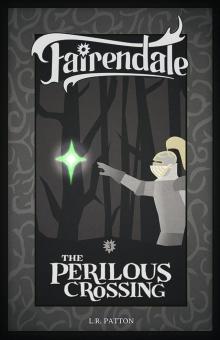 The Perilous Crossing
The Perilous Crossing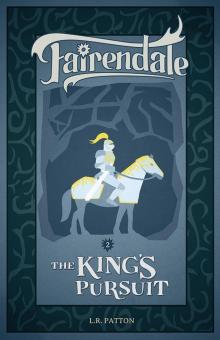 The King's Pursuit
The King's Pursuit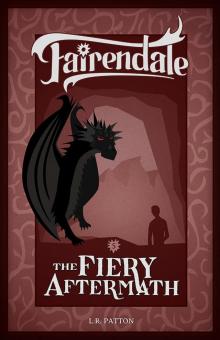 The Fiery Aftermath
The Fiery Aftermath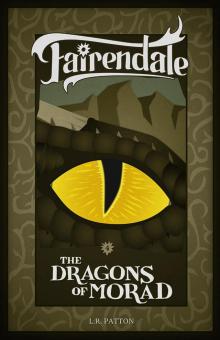 The Dragons of Morad
The Dragons of Morad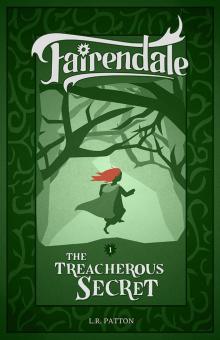 The Treacherous Secret
The Treacherous Secret